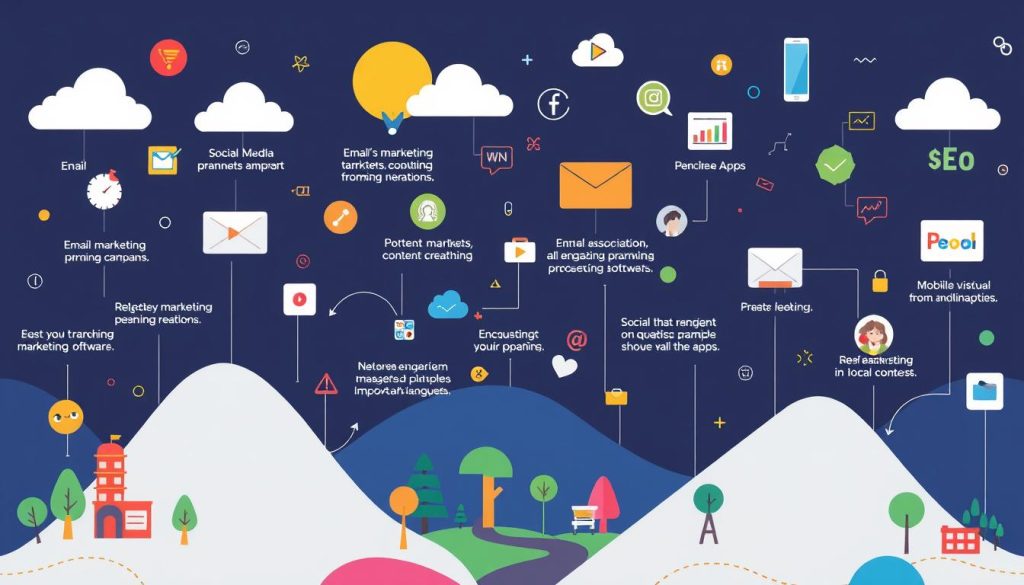Software companies are discovering new opportunities in underserved markets. These regions offer a chance to grow and reach new customers. This guide explores strategies for promoting software in these untapped areas.
We’ll look at finding the right audience and using tailored marketing tactics. Our focus is on connecting with local communities effectively. By following these tips, you can expand your reach in these promising markets.
Key Takeaways
- Analyze demographic data and technology adoption trends to identify promising underserved markets
- Understand cultural nuances and adapt your software solution to meet the unique needs of local communities
- Develop strategic partnerships with community leaders to build trust and credibility
- Leverage digital marketing strategies, including social media and influencer engagement, to reach your target audience
- Offer flexible pricing models and comprehensive training and support to ensure successful adoption
Identifying Underserved Markets
Finding untapped opportunities is crucial for software promotion in underserved markets. Businesses can pinpoint promising markets through demographic research and technology adoption analysis. This approach helps tailor solutions to specific needs.
Demographic Analysis
Analyzing demographic data uncovers underserved markets. Age, income, education, and location provide insights into consumer needs. These factors help businesses customize their software offerings for underserved communities.
Assessing Technology Adoption Rates
Evaluating technology adoption rates is vital for market analysis. Low software or hardware penetration areas present opportunities for new solutions. Understanding adoption patterns helps companies address unmet needs in underserved populations.
| Demographic Factor | Underserved Market Insights |
|---|---|
| Age | Younger or older populations may have unique technology needs and preferences. |
| Income Level | Low-income communities may require more affordable software solutions. |
| Education Level | Populations with lower levels of education may benefit from user-friendly software interfaces. |
| Geographic Location | Rural or underserved regions may have limited access to advanced technology and software. |
Combining demographic research and technology adoption analysis is key. It helps businesses spot promising underserved markets for their software. This approach sets the stage for successful market expansion and growth.
“Identifying underserved markets and understanding their unique needs is the key to unlocking new growth opportunities for software companies.”
Understanding Cultural Nuances
Promoting software in underserved markets requires understanding cultural nuances. Cultural considerations, localization, and market-specific preferences can greatly impact marketing success. Tailoring your approach to these factors is crucial.
Local communication styles vary widely. Some markets prefer direct messaging, while others value subtlety. Learn common idioms, body language, and cultural references to connect with your audience effectively.
Visual cues and symbols hold different meanings across cultures. What’s acceptable in one place might offend in another. Adjust your imagery, colors, and design to match local preferences.
Decision-making processes differ between markets. Some cultures prioritize group decisions, while others focus on individual choices. Adapt your strategies to address the right decision-makers and influencers.
| Cultural Consideration | Example |
|---|---|
| Communication Style | Direct vs. Indirect messaging |
| Visual Cues and Symbols | Acceptable imagery and color schemes |
| Decision-making Process | Individual vs. Collective influence |
Understanding cultural considerations, localization needs, and market-specific preferences is key. This knowledge helps tailor your software promotion strategies effectively. It allows you to connect with local communities and boost engagement.

Tailoring Your Software Solution
Adapting your software for underserved markets is vital. This section explores strategies for software localization, internationalization, and affordable pricing models. These approaches help meet unique consumer needs and preferences.
Localization and Internationalization
Localizing software means adapting it to regional languages and cultures. It’s more than translation. It requires understanding local customs and user preferences.
Localizing your software creates a user-friendly experience that connects with your audience. It makes your product more intuitive and relatable.
Internationalization strategies ensure easy software adaptation to different markets. This includes designing scalable architecture and flexible input methods. It also involves accommodating various date, time, and currency formats.
Affordability Considerations
Affordability is crucial in underserved markets. Developing suitable pricing models can boost your software’s accessibility and adoption rates. Consider tiered pricing, subscriptions, or freemium options.
Explore creative financing solutions to enhance affordability. Local payment methods and installment plans can make your software more attainable. Prioritizing affordability widens your consumer base in underserved markets.
“Successful software promotion in underserved markets requires a deep understanding of local needs and a willingness to adapt your solution accordingly.”
How To Promote Software In Underserved Markets
Promoting software in underserved markets needs a smart approach. Let’s explore effective software promotion strategies and marketing tactics to reach your target audience.
Build Local Partnerships
Team up with community leaders and trusted groups. This helps you understand customer needs better. It also opens new ways to promote your product.
These partnerships can boost your chances of gaining customers. They provide valuable insights into local preferences and market trends.
Leverage Digital Marketing
Use online channels to connect with your audience. Create a strong digital marketing strategy including social media and targeted ads.
Work with influencers to spread the word. This approach can boost awareness and drive customer acquisition effectively.
Offer Flexible Pricing
Underserved markets may have unique money concerns. Offer various pricing options to make your software accessible.
Consider tiered pricing, subscriptions, and payment plans. This ensures affordability for a wide range of customers.
Prioritize Training and Support
Provide thorough user onboarding and ongoing customer service. This ensures successful software adoption and long-term use.
Good training and support build trust and loyalty. They also encourage more customer acquisition through word-of-mouth referrals.
Use these software promotion strategies and marketing tactics to reach underserved markets. They’ll help drive growth and success for your software solution.

Building Local Partnerships
Promoting software in underserved markets requires a strategic approach. Building strong local partnerships is key to reaching your target audience. Collaborating with community leaders and influencers can amplify your reach and establish credibility.
Collaborating with Community Leaders
Community leaders are invaluable allies in software promotion efforts. These include local business owners, non-profits, and civic groups. They understand the local market’s unique needs and challenges faced by the underserved population.
Community leaders often have significant influence and trust within their circles. Their endorsement can help establish a strong presence among potential customers. This is crucial in markets where trust in new technologies may be low.
- Identify and connect with influential community leaders
- Collaborate on co-marketing initiatives, such as events or workshops
- Leverage their networks and channels to amplify your software’s visibility
- Seek their feedback and incorporate their insights into your software development and marketing strategies
Fostering local partnerships creates mutually beneficial relationships. It not only promotes your software but also contributes to community development. These partnerships can empower underserved communities and drive positive change.
Leveraging Digital Marketing Strategies
Effective online marketing is crucial for promoting software in underserved markets. Social media outreach and influencer collaboration can help businesses connect with their target audience. These strategies drive awareness and adoption of software solutions.
Social Media Outreach
A strong social media presence is vital in underserved markets. Platforms like Facebook, Instagram, and Twitter offer chances to engage with potential customers. They allow companies to share content and build brand loyalty.
Creating a tailored strategy with localized messaging is key. This approach helps software companies effectively reach and connect with their audience.
Influencer Marketing
Partnering with influential figures in underserved communities boosts software visibility and credibility. Identifying relevant digital marketing influencers helps tap into established trust networks. This strategy expands reach to a wider audience.
Using social media promotion through influencer-generated content is highly effective. Endorsements from these influencers can greatly impact influencer collaboration efforts.
| Digital Marketing Tactics | Potential Impact |
|---|---|
| Social Media Outreach | Increased brand awareness, customer engagement, and lead generation |
| Influencer Marketing | Enhanced credibility, expanded reach, and improved conversions |
Combining these strategies helps software companies promote solutions in underserved markets. This approach expands their customer base and drives business growth. It’s an effective way to reach new audiences and increase adoption.

Offering Flexible Pricing Models
Flexible pricing models make software accessible to underserved markets. They cater to unique financial needs and constraints. This strategy ensures your software solution is within reach for your target audience.
Subscription plans allow users to pay a recurring fee for ongoing access. These plans can be tailored to different budget levels. They provide options for a wide range of users.
Pay-as-you-go models offer even more flexibility. Users can access the software as needed without long-term commitments. This option is ideal for those with sporadic needs.
| Pricing Model | Key Benefits | Suitable for |
|---|---|---|
| Subscription Plans |
|
Users who require consistent access and long-term commitment |
| Pay-as-you-go |
|
Users with intermittent needs or limited financial resources |
Diverse pricing models ensure your software is affordable and accessible to a wider audience. Pay-as-you-go options cater to users with limited budgets. This flexibility promotes affordability and fosters greater adoption of your software.
Providing Comprehensive Training and Support
User education and support are vital when promoting software in underserved markets. Robust onboarding programs ensure a smooth user experience. Dedicated customer service drives adoption and retention.
User Onboarding Programs
Effective user onboarding is key for successful software adoption. Step-by-step guides and interactive tutorials help users master the software quickly. Hands-on training sessions, both in-person and virtual, build user confidence.
Ongoing Customer Service
- Provide multiple channels for users to reach out, such as email, chat, and phone support.
- Ensure quick response times and a personalized approach to address user inquiries and concerns.
- Develop a comprehensive customer support knowledge base, including FAQs, troubleshooting guides, and how-to videos.
- Continuously gather user feedback and use it to improve training resources and customer success initiatives.
Investing in comprehensive user onboarding empowers users in underserved markets. Strong customer support programs foster long-term engagement. Together, these efforts build user loyalty.

“Providing exceptional user onboarding and customer support is the key to driving software adoption in underserved markets.”
Monitoring and Adapting
Promoting software in underserved markets requires ongoing performance tracking. It involves gathering market feedback and making iterative improvements. This approach keeps your solutions relevant to your target audience’s evolving needs.
Monitoring key performance indicators is vital for understanding promotional impact. Metrics like user engagement and conversion rates offer valuable insights. They show what’s working and where adjustments are needed.
Gathering market feedback through surveys and customer interviews helps identify emerging trends. Online reviews also provide useful information. Listening to your audience helps you enhance your software and marketing approaches.
The software landscape constantly evolves. Staying competitive requires an iterative improvement mindset. Analyze collected data and adjust your strategies accordingly.
Implement agile development practices to keep your software responsive. This ensures your offerings remain competitive in underserved markets.
| Key Performance Indicator | Metric | Importance |
|---|---|---|
| User Engagement | Time spent on the app, number of sessions, and user activity levels | Indicates how effectively your software is meeting the needs of your target audience |
| Conversion Rates | The percentage of users who complete a desired action, such as making a purchase or signing up for a subscription | Measures the effectiveness of your marketing and sales strategies |
| Customer Retention | The rate at which users continue to use your software over time | Reflects the long-term value and satisfaction your software provides to customers |
“Continuous monitoring and adaptation are the keys to success in underserved markets. By closely tracking your performance, listening to your customers, and making iterative improvements, you can ensure your software remains relevant and valuable to those who need it most.”
Conclusion
We’ve explored strategies to promote software in underserved markets. These insights can help businesses expand their reach and unlock growth opportunities. By understanding cultural nuances, you can tailor solutions to meet unique community needs.
Local partnerships and digital marketing are crucial for connecting with your audience. Flexible pricing models help foster trust and engagement. Comprehensive training and support ensure exceptional value delivery to customers.
Stay agile and prioritize user needs when promoting software in underserved markets. This approach drives expansion and increases your customer base. Your software can become a trusted solution in these emerging markets.




